Podcast
Questions and Answers
What is the primary application of De Moivre's theorem in complex analysis?
What is the primary application of De Moivre's theorem in complex analysis?
- To solve quadratic equations in complex numbers
- To determine the convergence of infinite series
- To find the roots of unity
- To evaluate trigonometric functions of complex arguments (correct)
What is the relationship between hyperbolic functions and trigonometric functions?
What is the relationship between hyperbolic functions and trigonometric functions?
- Hyperbolic functions are unrelated to trigonometric functions
- Hyperbolic functions are a subset of trigonometric functions
- Hyperbolic functions are the inverse of trigonometric functions
- Hyperbolic functions are analogous to trigonometric functions (correct)
How are the real and imaginary parts of a complex number separated?
How are the real and imaginary parts of a complex number separated?
- Using De Moivre's theorem
- Using Euler's formula
- Using the quadratic formula
- Using the property of conjugates (correct)
What is the principal value of the logarithm of a complex number?
What is the principal value of the logarithm of a complex number?
What is the relationship between the logarithm of a complex number and its conjugate?
What is the relationship between the logarithm of a complex number and its conjugate?
Flashcards are hidden until you start studying




